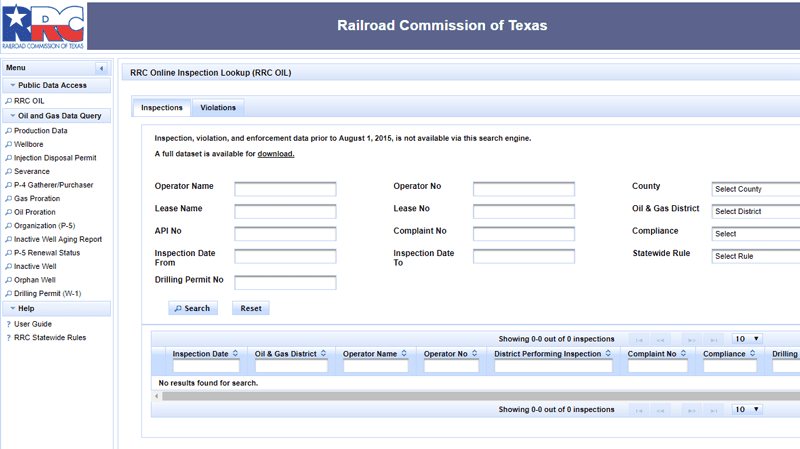With the new year, a much anticipated online tool became available for those interested in statewide inspections and enforcement information within the oil and gas business in the state of Texas.
A searchable database was launched by the RRC (Railroad Commision of Texas) on January 23, 2019 and is aptly named RRC OIL (Online Inspection Lookup). RRC is the Texas state agency that regulates the oil and natural gas industry (among others) within the state.
At the time of the launch, Chairman Christi Craddick said, “RRC Online Inspection Lookup continues our efforts to use improved technology to deliver more accessible information to the public and industry on the work of this commission.”
A user can search the website 24/7 using a variety of criteria including operator name, lease name/number, API number, County, RRC District, inspection date range and rule. The data gathered from a search ranges from the period of August 2015 to present. The database is updated nightly.
“Government transparency keeps citizens informed and engaged. The Railroad Commission has made great strides on transparency under our watch, and I am pleased that through initiatives like RRC OIL we continue to lead the way,” said Commissioner Ryan Sitton.
OIL accesses the inspection and violation data entered into their system by their staff of 158 field inspectors. Not an easy task for the approximate 300,000 active wells within the state. This small staff of inspectors have averaged more than 123,000 inspections of oil and gas operations within the last ten years and anticipate another 130,000 for the year 2019.
Their data can be reviewed online from within the OIL database or can be downloaded as a ‘data set’ and printed in .txt format. Data sets are updated weekly. Disclaimers caution the end user that all information provided is continuously being updated and should be used for informational purposes only. But, even at that, the use of the OIL database is a great starting point when researching this type of data.
Information can be obtained for one inspection or the entire state of Texas. Only completed inspections will contain data, otherwise the field is blank or will contain values such as “unknown” or “00000.” This may be a result of the inspector not having information made available to him at the time of the inspection or the data in that field is not part of the criteria for the search you entered. An example would be when lease and facility inspections are performed, data such as an API number or Well Number would not be applicable and in those cases be left blank.
When searching for a violation, a record would be displayed for each violation that meets the search criteria. Only the initial violation will be displayed. No additional information will be displayed for follow-up inspections. The same logic applies if a field is not applicable to the search criteria or the information is not available to the inspector at the time of inspection. The field will be either blank or contain the values as “unknown” or “00000.”
If you have multiple pages of results, the OIL database provides you with the appropriate button to navigate your results. You can navigate page by page or click on specific pages to see the results of your search. Options are also available for displaying more or fewer results and sorting within the results you have obtained. In addition, filters can be used on any column by entering a value within that field and only the data matching the filter will be displayed.
The online RRC OIL database is important to not only operators and owners, but to the general public as well. In 2012 the RRC began publishing quarterly reports of oil and gas enforcement data on its website. Some found the report to be lacking in information and only a partial representation of the information at hand. With the new OIL database, specific information on every well, active or inactive, within the entire state of Texas can be found. The continual updates of such information is key.
Statewide rules by which the RRC operate are also included within the OIL database. Violations of such rules are linked to each inspection. Operators, owners and the general public can research this information to determine compliance.
Property owners can readily find information about wells that have been drilled on their land and determine the last time an inspection was performed. This saves the property owner the tedious task of having to gain such information from the operator or from RRC itself.
Abandoned or orphaned wells have also been a major concern in Texas. Some wells have been abandoned for years leaving property owners in a quandary as to what to do. Until such time as these abandoned wells are plugged properly there is always a concern for safety, ground water contamination and other environmental issues. Using the OIL database, a property owner can check the status of a situation such as this and determine the best step forward.
Some consider abandoned wells an opportunity for future investments. Abandoned wells are routinely bought by operators in hopes of future production. A simple search of the OIL database would enable these investors a broader picture of where to make their next play.
Commissioner Wayne Christian commented on the new OIL database feature of the RRC website saying, “This tool will be helpful to our agency, the industry and most importantly, the general public in ensuring individuals have easy, transparent access to data regarding the regulation of our natural resources.”
With the exciting new features of the OIL database, no more the time consuming and sometimes frustrating task of researching and making repeated phone calls, only to be transferred to someone else who might have an answer. OIL has all current information at hand for you to discover at the click of a mouse.
Transparency has become a buzz word in today’s climate. RRC’s OIL database has opened the door to having RRC become more transparent than ever. Not only does it offer the means by which anyone can search for current information concerning inspections and compliance issues in the massive oil and gas reserves we enjoy here in Texas, but with RRC’s OIL database, it has also brought the Texas Railroad Commission into the 21st century.
The RRC OIL database can be found online at the following link: https://rrc.texas.gov/about-us/resource-center/research/online-research-queries/oil-and-gas-inspections-and-violations-query/ or by going to the home page of the Texas Railroad Commission’s web site at https://rrc.texas.gov and looking on the right side bar for the link entitled RRC Online Inspection Lookup.
The CEO of U.S. Energy Media, Emmanuel Sullivan is a technical writer who has built up his profile in the oil and gas industry. He lives and works in Houston, where he publishes Oilman and Oilwoman on a bimonthly basis, and Energies quarterly, distributing the magazine to energy thought leaders and professionals throughout the United States and around the world. At a time when technology is rapidly changing, he provides an invaluable service to oil & gas, and renewable energy executives, engineers, and managers, offering them both broad and specific looks at the topics that affect their livelihoods. Sullivan earned his BA in Communications at Thomas Edison State University and his MA in Professional Writing at Chatham University.













